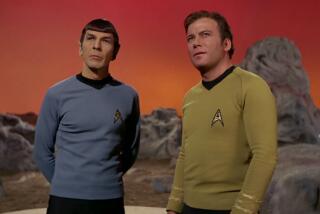NEW ‘TREK’ IS ON THE LAUNCH PAD
- Share via
An all-new “Star Trek” series set a century ahead of the original NBC show will make its way to the home screen next September, when “Star Trek: The Next Generation” begins syndicated broadcast.
“Star Trek” series creator Gene Roddenberry will serve as executive producer of the show, which will feature an all-new cast.
Paramount Television Group officially announced the new “Star Trek” series Friday morning after months of speculation. The series, which begins production next year, will launch with a two-hour TV movie to be followed by 24 hourlong episodes during the 1987-88 season.
But Trekkies beware: Most of the elements of the 1966-69 television series or the four movies it inspired will be gone. There may not even be a spaceship of any kind, let alone the Enterprise, which was destroyed in the last film, “Star Trek III: The Search for Spock.”
“I’m now blue-sky on everything,” said Roddenberry, whose return to hands-on involvement was central to Paramount’s plans. Roddenberry noted that 100 years beyond the original series’ setting “people might travel by some means other than spaceship.” He conceded, however, that “I probably will end up using something like the Enterprise.”
The same wide-open future also could hold the possibility for guest visits by some of the original crew, which included William Shatner as Capt. James Kirk, Leonard Nimoy as the Vulcan Mr. Spock and DeForest Kelley as Dr. Leonard McCoy. “I’m not planning that but I’m pleased that the door’s not closed,” Roddenberry said. “In science fiction, you can never really close the door on anything.”
There is no cast as yet for “Star Trek: The Next Generation,” part of the twist that helped the series get a green light. Paramount had held back from producing a new “Star Trek” TV effort partially from fear that it would hurt the box office potential of the “Star Trek” films. The latest, “Star Trek IV: The Voyage Home,” opens Nov. 26.
But Mel Harris, president of Paramount Television Group, said that issue is no longer a concern, since “The Next Generation” is not “going with the same players and the same venue” as the motion pictures.
With reruns of “Star Trek’s” original 79 episodes maintaining their popularity--and now seen in syndication on 145 independent stations--all three major networks had expressed interest in a reborne series, Harris said. Most recently, the Fox Broadcasting Co. aggressively sought a new “Star Trek” series for the prime-time lineup it is putting together for its new network of independent stations.
But Paramount decided to bypass all networks. Instead, it will distribute the series itself to the same stations currently running the old “Star Trek” reruns.
“We decided, in the final analysis, after an 18-month gestation period, that because this is a 20-year legacy of Paramount’s, nobody is going to give it the same degree of attention and tender loving care than we will,” Harris said.
Too, the sophistication of independent stations, both in terms of scheduling and promotion, means that Paramount can effectively attract a large audience without having to share the resulting advertising revenue with a network.
Paramount also wanted creative control and needed to offer a guarantee of freedom to Roddenberry before he would become involved. As creator, Roddenberry contractually would have to approve a new series, he said, but beyond that “Paramount doesn’t want to and the fans don’t want to” have a new series without his stamp.
That was why Roddenberry has waited 20 years from “Star Trek’s” first airing to work on a new version of the series.
“In the past, all of the talk about a new television show was an exact retread of the old one,” he said. “ ‘Get another guy who looks like a Vulcan, get a guy who looks like Kirk.’
“This time, it is more of a challenge. There are things you’ve done in the past that you wouldn’t do again.”
Roddenberry said that the former Paramount regime led by Barry Diller was a stumbling block to bringing back the show. Diller spearheaded attempts at a new “Star Trek” series while at Paramount and after moving to 20th Century Fox, where he started the FBC network.
Diller wanted a “retread,” Roddenberry said, and wasn’t receptive to his ideas. “I’m talent and some people don’t talk to talent,” he said when asked about his relationship with Diller regarding “Star Trek.”
Only four weeks ago, Roddenberry said, Paramount gave him the new challenge to create a totally new environment for a reborne “Star Trek.”
For Roddenberry, that once again means an opportunity to delve into social issues.
“I never really wanted to do a space or science show--I wanted to do a people show,” he said. “The advantage of space is you can put people in all sorts of situations. It allows you to probe.
“People often forget that back in 1966, to put a multiracial crew on a ship was considered awful by network and studio officials. They said things like, ‘No, you must have people smoke cigarettes, that’s one of our biggest sponsors.’ We were ahead of our time definitely on sexual equality.”
For “The Next Generation,” Roddenberry said, he again wants “to shock people.”
“I want to treat the whole problem of terrorists. I don’t think that’s ever been treated in depth.”
More to Read
The complete guide to home viewing
Get Screen Gab for everything about the TV shows and streaming movies everyone’s talking about.
You may occasionally receive promotional content from the Los Angeles Times.






